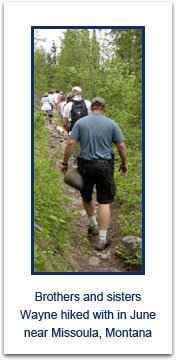We Already Have a Shepherd! Leadership in the Relational Church – Part 8
By Wayne Jacobsen
BodyLife • December 2002
 What did Jesus have in mind when he spoke of leadership among the incredible community of the Body of Christ?
What did Jesus have in mind when he spoke of leadership among the incredible community of the Body of Christ?
By Wayne Jacobsen in collaboration with Kevin Smith, a good friend from Australia. This article grew out of a conversation that began during a trip there.
Here is the best definition I’ve ever heard of spiritual leadership: If you were going to be caught in your worst failure, who would you want to catch you?
If you really want to experience the fullness of life in Jesus, wouldn’t you want someone who would treat you as gently as Jesus treated the woman at the well while offering you the truth in a way that you could understand and follow into God’s freedom?
I have not heard a simpler statement that summarizes the way Jesus lived and what he taught his disciples about leadership in his church. Even Paul’s lists of qualifications in Timothy and Titus point out those who had walked with Jesus long enough to be transformed by him in a way that could be clearly seen in their families, in the community and their freedom to live the truth and thus be able to help others in the way Jesus would.
Perhaps the question I’m most asked in my travels is, “How do you see leadership functioning among people who embrace relational Christianity?” The question itself points out two significant problems with our perception of church. First, it is so dependent on the leadership of men and women that many cannot imagine how to function without it. That is tragic, because if our dependency isn’t in Christ we will never discover the power and simplicity of body life.
Second, our perception of leadership is so imbedded in managing or controlling institutions, that we cannot recognize it without titles and positions. Jesus said leadership in his kingdom would not need either and would serve an entirely different function than it does in the world. Unfortunately we’ve allowed ourselves to be squeezed into the world’s mold on this one.
If you can, set aside all your preconceived notions of human leadership and read the New Testament again with a fresh eye. The leadership of Father’s family is clearly placed in the hands of Jesus as its Head, and the Spirit as the one who joins us together and sets us in the body as he desires. Human leadership is not the main focus of Christ’s body. Jesus hardly mentions it and most of the letters don’t reference it at all.
But there were leaders in the early church, people protest, and I wholeheartedly agree. The important question is, just what kind of leaders were they?
Not So With You!
“You know that those who are regarded as rulers of the Gentiles lord it over them, and their high officials exercise authority over them. Not so with you. Instead, whoever wants to become great among you must be your servant, and whoever wants to be first must be slave of all. For even the Son of Man did not come to be served, but to serve, and to give his life as a ransom for many.” (Mark 10:42-45)
Clearly Jesus warned his disciples that in God’s reality leadership serves a different function than it does in the world because it is not based on management. Yet many books on Christian leadership today are so easily adapted to the business world. That alone should make us stop and question.
Jesus didn’t view leadership as the power to command, but the passion to serve people as they sort out what it means to live as God’s children. In the last decade my understanding of leadership has changed completely. I used to see it in terms of power – thinking leadership was defined by influence, institutional power or the value of their giftedness.
That’s not so in God. Those who have helped me most to grow in Father’s love, surprisingly enough, don’t hold positions of power but simply loved me enough to point out the way to God’s heart and then let me decide if I wanted to follow it. In fact, those I meet now who are most transformed by Father’s character disdain the power of the institutions I thought so essential to the kingdom. They reject anything that doesn’t reflect the childlike freedom to walk together focused on doing what pleases our Father.
The first person I ever met like that shocked me. Whenever he opened his mouth, wisdom poured out in the simplest terms. He knew more about God than I’d ever hope to and his calm spirit mirrored the nature of Jesus that I’d read about in the Gospels.
He had been a pastor for a number of years, but left during a brutal congregational fight rather than resort to their tactics to secure his place. For the next 15 years he hung wallpaper, which I thought he was doing just to pay the bills until he could find another ministry position. I was wrong! But I really didn’t realize how wrong until one day when I told him we were considering him as a future elder and eventually as full-time staff.
To my absolute shock, he listened for a while and then shook his head. “I’m just not interested,” he said. When I pressed him as to why he just smiled and told me that I would understand some day.
I think now that I know what he means. Those who most effectively function in leadership in this body don’t need titles, salaries or positions of authority. In fact, those things will only distract from God’s calling. Those who have been shaped by Christ’s life know there is an inherent conflict between spiritual authority and institutional power. Unfortunately, most people in the institution don’t understand this truth, and they continue to be hurt by those who act as leaders and fail to recognize true leadership God has so generously scattered throughout his body. Perhaps we need to think differently.
Transformed Lives Not Credentials
I’ll never forget the first time I saw ‘Rev. Wayne Jacobsen’ pressed on an office door. Even with my vocational mindset of ministry 27 years ago it was a shock. I was 22 with a BA in Bible and two weeks experience in marriage. How was I supposed to be a leader among the body of Christ? It would be laughable now if it were not so tragic. Even though God used that time in my life in spite of how deeply I misunderstood him, I realize now how little my life at that point reflected God’s priorities.
Though I couldn’t recognize it at the time I know now that I was driven less by a desire to serve others as I was to satiate my ego by trading on my speaking ability and proving my worth by influencing as many people as possible. What’s even stranger is that people did so without even questioning whether this is what God wanted.
Today people qualify for leadership based on their university degrees, eloquence, Biblical knowledge or their ability to draw a crowd, manage a vision or manipulate people to help them achieve their goals. If they draw a salary from a religious institution or hold a title we believe them to be leaders even if their lives don’t reflect his life.
Will that ever change? Not on this side of eternity! We have spawned an entire industry of seminaries and institutional positions to ‘prepare’ people to lead our religious institutions. They come out with $30,000.00 of debt and the need to find a career to justify that expense. All the while they have never even had the time to be transformed by the life of Christ and to demonstrate it in their personal life. No wonder there is so much failure and error among those who seek to lead in the Body of Christ.
Mostly well-intentioned men and women get into ‘the ministry’ for all the right reasons and then stay for all the wrong ones. The New Testament recognizes leadership by the evidence of a transformed life that lives in vital, daily, dynamic, relational connection with the head. People could tell they had been with Jesus. It didn’t matter what gifts they possessed or lacked, only that their character had been transformed to such an extent that they began to treat others the way Jesus would – with the same mix of truth and tenderness.
That’s why it is so important that every believer be thoroughly acquainted with the Jesus of the Bible, because the only way we can recognize Godly leadership among us is when people reflect his glory, his truth and his demeanor in the way they live.
Supplements not Substitutes
The body of Christ can only be healthy where every member in it is growing in relationship to Jesus and learning to live in his view of reality. He is the Head so that he “might come to have first place in everything.” (Col 1:18) That can happen only as every believer experiences the depth of friendship that Jesus wants with each of us.
Unfortunately leadership in our day doesn’t always help people live in that reality but often offers a substitute for it – and people like it that way. Like the children of Israel, many prefer to keep God at arm’s length expecting so-called leaders to deal with God for them so that they can follow only when they think it best.
For two thousand years this view of leadership has stripped God’s people of their confidence in his ability to work in them and has made them dependent upon clergy and institutions for their spiritual life. Isn’t it amazing that every religious system creates a local, holy-man guru who becomes the resident expert on things spiritual? Neither Jesus nor Paul ever envisioned the role we have ascribed to vocational pastors, priests and ‘workers’ today who supplant Jesus’ place among his people. These gifts Jesus spread over a far wider group of people who help others put their dependence on Christ, not themselves, their programs or their books!
The early apostles never saw it as a threat to their place in the body to say things like, “You have no need for anyone to teach you.” “You have an anointing from the Holy One to know truth and error.” They wanted Jesus’ followers to learn to trust him and hear from him directly as they lived in mutual relationship with each other.
They were not discounting the importance of teaching or counsel, but only putting it in its proper place. Whatever gift we have in the body, it is only to supplement his working in people, not to become a substitute for it. At best the touch of a leader is only temporary, helping people along the way, then quickly returning to the more enduring place of brother or sister.
Leadership in the body simply happens as Jesus expresses himself by the Holy Spirit through a submitted life. Sadly the star syndrome in the church often means that we elevate and give glory to the messengers rather than to the rightful ruler.
No one can take Jesus’ place in the body. That’s why Paul told people not to listen to anyone who distorted the gospel of Jesus (Gal. 1) nor to follow anyone purporting to know God’s will for others. (Col. 2) Those who have Jesus’ heart for the body will always be wary of others growing dependent upon anyone but the Lord himself. They would never rob a brother or sister of the joy of learning how to live freely in daily submission to Christ alone.
To Serve Not to Manage
One popular teacher a couple of decades ago defined spiritual leadership as the ability “to motivate people to do what they wouldn’t otherwise freely chose to do.” That’s manipulation not leadership. While it may be true of drill sergeants in basic training or advertising executives designing commercials, it is the opposite of what God has in mind for his children.
Virtually everyone today gives lip service to the biblical ideal of servant leadership, but most don’t realize that as long as you try to get people to do what you think is best for them you act as their master, not their servant. You are not serving them; they are serving you.
If anyone had the right to be served you’d think it would be Jesus, who is after all the King of Kings and Lord of Lords. But even he didn’t take advantage of his position (when he certainly could have) but instead concerned himself with helping others to settle down at home in his Father’s life.
We can barely talk of leadership today without using the language of management. We see leadership as those who by power, influence or anointing compel others to act. Our religious systems take people who have a heart for God and turn them into program managers who make people conform to their program and think it is loving to do so. Those who get to the top of any institutional process hold great power over people and derive great personal benefit from it as well.
When Jesus lived in the flesh, he didn’t treat power the way others did and it drove his disciples nuts. Rather than gather power, he emptied himself of it. He knew that the way to help people into the Father’s life was not to direct them there, but to let them see his Father’s reality and help them learn to live in it. He knew compelling people would never work so he always gave them the freedom to choose. Likewise the early disciples had the grace to tell people the truth, and then let them go so they would be free to choose as their conscience directed.
Any Godly leader will do the same. He won’t create power centers of influence, money or programs that can be managed or exploited, but will release the body to do as God leads them.
Function Not Identity
Beware of anyone who finds their identity in the body based on a role of leadership or a title of ministry. As clearly as Jesus told us anything, he told his followers not to depend on such nonsense, for it is based on a false view of our Father’s family. “But do not be called Rabbi; for One is your Teacher, and you are all brothers. And do not be called leaders; for One is your Leader, that is, Christ.” (Matt. 23:8.10)
The primary relationship for each member of the body is to be connected to the Head, then to share his life with each other as brother and sister. No greater identity is needed than to be sons and daughters of God and brothers and sisters in Christ, and anything God asks us to do to help others will not alter that simple identity. The fact that our culture has built body life around ‘leaders’ and ‘nonleaders’ robs the body of the freedom to share God’s life together.
Those who seek credibility in their degrees, their prowess with the original languages of Scripture, or some kind of ‘extra’ anointing not available to other believers, demonstrate by doing so how little of God’s nature they truly understand. Whatever elevates you above others destroys the value of anything God wants to share through you.
So, what do leaders do? Scripture gives us three functions for leadership:
To Facilitate Not Control: Leading in the body is as simple as initiating, at God’s leading, actions and activities and inviting others to come along and share in that experience. Leadership doesn’t seek to control an event or make sure it happens the way they think best, but acts as a catalyst to allow others to express what God has revealed to them. That happens as simply as someone leading out in a chorus, inviting people over for fellowship, or planning an outreach activity. A gift of leadership can get the ball rolling and see if others will pick it up and run with it.
To Equip Not to Perform: Instead of taking center-stage in the body with their gifts, true leaders crawl behind the scenes to help others grow in the life of Jesus and discover how God wants to express himself through them. Since this is best accomplished by example, they will live open lives before others as they help others learn how to connect with God in a meaningful way. They never exploit people’s shame or try to hold them accountable, but free them from shame so that they can engage in a transforming relationship with God. (Anyone who does this knows it happens best in smaller groups where there is a real exchange of dialog rather than in large-scale seminars.) As people become free in God’s life, they will know how to relate to others and that will allow the body to reflect a fuller picture of who Jesus is to the world around them.
To Watch Over Not Police: While not trying to manage the body, leaders will look beyond themselves to help the body live in wholeness. They will seek out those who exploit the body for their own gain and deal with them honestly and lovingly. They will help young believers learn to discern between true and false believers and point them back to Jesus when they are distracted.
One Flock With One Shepherd
When God exposed the false shepherds in Ezekiel 34, he didn’t say he would get rid of the false shepherds and find better ones. He said he would remove the false shepherds and shepherd them himself. He would lead them to safe pastures and protect them from harm so that they would never be afraid or abused again.
With that instruction, why do we have so many people today who insist on being shepherds? That’s not what I Peter 5 is about. Peter tells those called as elders to lead like Jesus did, not by compulsion, not for money, nor to lord over the flock, but simply by being an example of Christ’s life to others.
Those who try to act on his behalf in this way are put in an untenable position. Eugene Peterson described it in his translation of Psalm 14:3 as “Sheep taking turns pretending to be the shepherd.” It gives false teachers a platform to deceive and manipulate people and corners well-meaning people into roles that distort the reality of God’s family.
Why do we think that we need leaders to follow when we have the Leader himself? In John 10 Jesus said he was the only shepherd and those who follow him “shall become one flock with one shepherd.” Why is the body of Christ so weakened and divided today? Because we march to a thousand shepherds, each claiming the mantle of Christ and each leading people to what they think is best.
How do you live this reality practically? If you find yourself weighed down by someone who wants to be your shepherd, take some distance. While you may benefit from some of God’s work in them, living your spirituality through them will only rob you. Don’t think you have to dismantle their organizations, just live in the freedom God gives you.
When God does bring someone near whom he has shaped by his life, listen and watch them without becoming dependent on them. Don’t be so paranoid of falling prey to false leadership that you miss the gifts of wonderful people God has put near you.
And if you’re one of those God has freed from the desire to rule over others, it may be time for you to step up. Don’t think for a moment that God led you outside the power structures to be isolated. He did it to free you from its clutches so you could serve people in a greater way into a fuller life in him.
We will be one flock when we embrace one shepherd. Only when we all learn how to live in him and follow him will we realize the joy and the power of the unity that he desires for his church. Any one who leads in this family, will want nothing less.
Download Article:
OTHER TRANSLATIONS
 Can someone try too hard to walk with God?
Can someone try too hard to walk with God?



 It’s been there for quite a while – a sense that Jesus is asking something of you. It doesn’t nag you at every moment, but often something will happen or something will be said that triggers your memory and brings it to your attention again. Suddenly you’re aware of a deeper stirring in your heart and even excited to think how it might come to be. Maybe you’re even reminded of it right now while you’re reading this.
It’s been there for quite a while – a sense that Jesus is asking something of you. It doesn’t nag you at every moment, but often something will happen or something will be said that triggers your memory and brings it to your attention again. Suddenly you’re aware of a deeper stirring in your heart and even excited to think how it might come to be. Maybe you’re even reminded of it right now while you’re reading this.

 I can’t begin to comprehend what it would be like to wake up tomorrow morning and find myself free of everything that hinders or distracts me from life in Jesus.
I can’t begin to comprehend what it would be like to wake up tomorrow morning and find myself free of everything that hinders or distracts me from life in Jesus. I have never been able to enjoy looking at a bird in a cage, even if it is a nice cage. While it may provide a safe haven and contain all the food and water she will ever need it also prevents her from doing the one thing God made her to do. A bird that cannot take wing and soar to the heights misses the best part of being a bird.
I have never been able to enjoy looking at a bird in a cage, even if it is a nice cage. While it may provide a safe haven and contain all the food and water she will ever need it also prevents her from doing the one thing God made her to do. A bird that cannot take wing and soar to the heights misses the best part of being a bird. Isn’t it interesting that you can spend all day wandering through the busy streets of Manhattan without anyone noticing you, and yet anyone you pass on a hiking trail will not only notice you but usually will pause to find out where you’ve been and where you are headed? The street is anonymous—people passing in a hurry to get somewhere else. There are far too many people to even consider engaging in a conversation. You would never get anywhere.
Isn’t it interesting that you can spend all day wandering through the busy streets of Manhattan without anyone noticing you, and yet anyone you pass on a hiking trail will not only notice you but usually will pause to find out where you’ve been and where you are headed? The street is anonymous—people passing in a hurry to get somewhere else. There are far too many people to even consider engaging in a conversation. You would never get anywhere. The reason you never see a flock of sparrows fly in V-formation is because they are not going anywhere. They flit around the yard from tree to tree, but at the end of the day they are in the same area. They could try to learn to fly in a V-formation, but by the time they got the formation together they would already be to the next tree and not need it. The same is true about fellowship. If Christianity is about rituals, routines and morals, our fellowship will suffer. We can rearrange our groupings or try a number of novel small-group techniques, but they will be as awkward as sparrows trying to fly in formation. But when Christianity is a life of growing dependence on God through the joys and challenges of our circumstances, pooling our wisdom becomes a natural extension of that life for us as it is for geese to fly in formation. When God is more real to you than the weather and the events of your day, you’ll find him filling your conversations and fellowship will be immediate, powerful and alive.
The reason you never see a flock of sparrows fly in V-formation is because they are not going anywhere. They flit around the yard from tree to tree, but at the end of the day they are in the same area. They could try to learn to fly in a V-formation, but by the time they got the formation together they would already be to the next tree and not need it. The same is true about fellowship. If Christianity is about rituals, routines and morals, our fellowship will suffer. We can rearrange our groupings or try a number of novel small-group techniques, but they will be as awkward as sparrows trying to fly in formation. But when Christianity is a life of growing dependence on God through the joys and challenges of our circumstances, pooling our wisdom becomes a natural extension of that life for us as it is for geese to fly in formation. When God is more real to you than the weather and the events of your day, you’ll find him filling your conversations and fellowship will be immediate, powerful and alive. In the last decade I’ve met thousands of believers all over the world and watched carefully as they seek to live out Christian fellowship in a variety of groupings – from twos and threes in spontaneous fellowship to centuries old congregations and just about everything in between. In many places I have been delighted to find God’s people sharing his reality together as they grow to know him. In others, I’ve watched in sadness as they struggle to replicate some form of New Testament body life, but despite their diligent efforts they continually end up disappointed and frustrated.
In the last decade I’ve met thousands of believers all over the world and watched carefully as they seek to live out Christian fellowship in a variety of groupings – from twos and threes in spontaneous fellowship to centuries old congregations and just about everything in between. In many places I have been delighted to find God’s people sharing his reality together as they grow to know him. In others, I’ve watched in sadness as they struggle to replicate some form of New Testament body life, but despite their diligent efforts they continually end up disappointed and frustrated. What did Jesus have in mind when he spoke of leadership among the incredible community of the Body of Christ?
What did Jesus have in mind when he spoke of leadership among the incredible community of the Body of Christ? By Wayne Jacobsen
By Wayne Jacobsen My father woke us up at 5:30 in the morning. We crawled out of our sleeping bags into the cold mountain air, ready for a fishing trip of a lifetime. Someone had told us that if we hiked out of the Dinky Creek campground up Rodman’s road for four or five miles, we would come to a creek where large rainbow trout lurked in every pool, ours for the taking. It would be the most incredible fishing experience we had ever known.
My father woke us up at 5:30 in the morning. We crawled out of our sleeping bags into the cold mountain air, ready for a fishing trip of a lifetime. Someone had told us that if we hiked out of the Dinky Creek campground up Rodman’s road for four or five miles, we would come to a creek where large rainbow trout lurked in every pool, ours for the taking. It would be the most incredible fishing experience we had ever known.